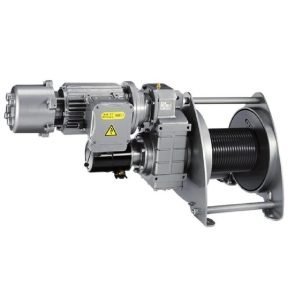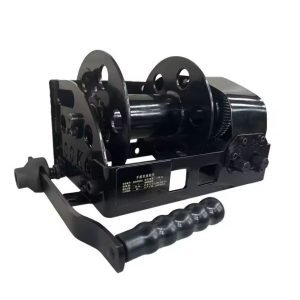When choosing a winch, one of the most important considerations is the type of engine that powers it. This decision can dramatically impact the winch’s performance, longevity, and suitability for specific tasks. Whether you need a winch for industrial purposes, vehicle recovery, or outdoor activities, selecting the right engine type will ensure you get the best performance for your needs.
In this article, we’ll discuss the different types of winch engines: electric winches, internal combustion winches, hydraulic winches, and manual winches. Each engine type offers distinct advantages and is suited for specific applications, so it’s essential to understand their strengths and limitations before making a decision.
Electric Winches: Convenience and Efficiency
What Are Electric Winches?
Electric winches are among the most popular types of winches available today. They are powered either by a direct connection to an electric motor or a battery, which can be especially useful in vehicle-mounted setups. These winches are well-suited for intermittent use, making them ideal for scenarios where heavy-duty pulling is only required on occasion.
Advantages of Electric Winches
- Ease of Use: Electric winches are relatively straightforward to operate, making them a favorite for DIY enthusiasts and professionals alike.
- Versatility: They can be mounted on vehicles, trailers, or used in industrial setups where access to electricity is readily available.
- Cost-Effective: Electric winches tend to be more affordable than their hydraulic or internal combustion counterparts, making them an excellent choice for occasional use.
- Compact Design: Electric winches often have a smaller footprint than hydraulic or combustion winches, which is beneficial for limited space applications.
Limitations of Electric Winches
Electric winches are not designed for continuous operation, as they can overheat during prolonged use. A key consideration when selecting an electric winch is choosing one with a thermal fuse to protect the motor from damage due to overheating or excessive load.
Additionally, if you opt for a battery-powered winch, make sure the battery has enough capacity. A 12-volt winch can draw as much as 400 amps during peak power consumption. Battery depletion is a significant concern during heavy or extended winching operations.
Internal Combustion Winches: Power for Continuous Use
What Are Internal Combustion Winches?
Combustion-driven winches use a gasoline or diesel engine to power their operation. These winches are known for their rugged durability and are commonly employed in situations where continuous, heavy-duty work is required.
Advantages of Internal Combustion Winches
- 100% Duty Cycle: Unlike electric winches, combustion winches are designed for continuous operation. They can run for extended periods without the risk of overheating, making them perfect for demanding tasks.
- High Power Output: These winches typically offer more torque and power compared to electric winches, allowing them to pull heavier loads without strain.
- Independence from Electrical Supply: Because they rely on fuel, these winches are excellent for remote locations or jobsites where electricity is unavailable.
Limitations of Internal Combustion Winches
While they are powerful, internal combustion winches tend to be heavier and more expensive than their electric counterparts. They also require regular maintenance, such as refueling and servicing the engine, which can add to the overall cost of ownership.
Furthermore, the noise and emissions produced by these winches can be a concern, especially in environments where quiet operation is essential.
Hydraulic Winches: The Heavy-Duty Workhorse
What Are Hydraulic Winches?
Hydraulic winches are powered by a hydraulic system, which typically connects to a vehicle’s or machine’s hydraulic circuit. These winches are well-known for their high load capacity and ability to operate in extreme conditions, including offshore environments and industrial settings.
Advantages of Hydraulic Winches
- Continuous Duty Cycle: Like internal combustion winches, hydraulic winches can be used continuously without overheating. This makes them ideal for heavy-duty industrial applications, such as marine environments and construction sites.
- High Load Capacity: Hydraulic winches can handle extremely heavy loads, making them suitable for applications like shipyards, oil rigs, and offshore platforms.
- Durability: Hydraulic systems are inherently robust and can endure harsh environments that would damage other winch types.
Limitations of Hydraulic Winches
One significant downside of hydraulic winches is that they require an existing hydraulic system to function. If your vehicle or machinery does not have a hydraulic circuit capable of providing the necessary pressure (up to 160 bar) and flow rate (up to 60 liters per minute), a hydraulic winch is not a viable option.
The installation process can also be complex, and regular maintenance of the hydraulic system is necessary to ensure smooth operation.
Manual Winches: Simple and Practical
What Are Manual Winches?
Manual winches are powered by human effort, usually through a hand crank or similar mechanism. These winches are best suited for light-duty tasks where access to power or hydraulics is limited or unnecessary.
Advantages of Manual Winches
- No Power Source Required: Manual winches are highly portable and can be installed in remote locations without access to electricity or fuel.
- Cost-Effective: These winches are typically the most affordable option, making them a good choice for occasional, light-duty tasks.
- Ease of Maintenance: Manual winches require minimal upkeep compared to other types, as there are no motors or hydraulic systems to service.
Limitations of Manual Winches
The primary limitation of manual winches is their limited power. They are generally only suitable for lighter loads and may not be practical for heavy-duty applications.
Additionally, operating a manual winch can be physically demanding, especially over long durations or with heavier loads.
Conclusion: Which Engine is Right for You?
When deciding which engine is best for your winch, consider the following:
- For occasional, light-duty use, an electric winch may be the best option, especially if portability and ease of use are important to you.
- If you need a winch for heavy, continuous use, a combustion or hydraulic winch is a better choice. These systems are built for durability and can handle longer duty cycles and heavier loads.
- For remote, light-duty tasks, a manual winch offers a cost-effective solution that doesn’t require any power source, though it is limited in power.

